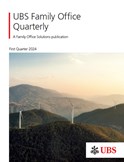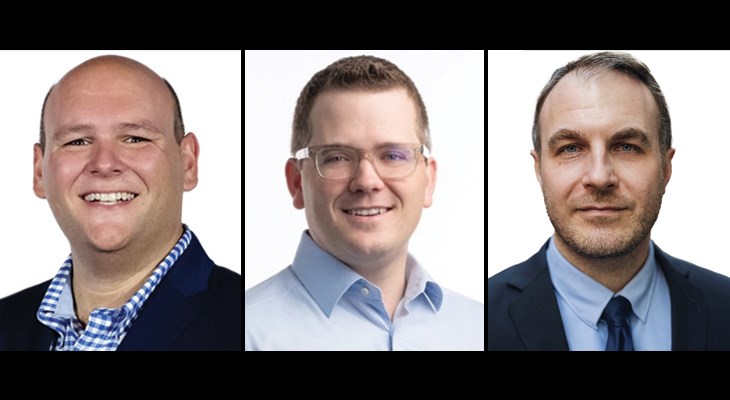Having been a life-long entrepreneur, founding and selling business when he was just 18, Rob Bellenfant launched 615 Ventures, a Nashville-based investment firm that creates value primarily through the acquisition and management of real estate nationwide. He says when he started the venture in 2015, family office was not in his vocabulary.
"In fact, that probably wasn't even the vocabulary until three years ago when we started working with UBS. And through those conversations, realized that, 'Oh, we're developing a family office here,' Bellenfant said at the Nashville Smart Business Dealmakers Conference. "And we didn't know that we just thought that we were investing in real estate and other asset types."
When entrepreneurs open a family office, UBS Family Office Design & Governance Strategist Mark Tepsich says often the founder is trying to do a dozen different things. There are many moving parts that require coordination.
"And the issue with families is they have an infrastructure for their business but when it comes to all the other moving parts — this can include trust structures, private investments, tax planning, tax preparation — they lack oftentimes an infrastructure. Sometimes they're leveraging that from people at their business. But at some point, that gets to be too much," Tepsich says. "And so, they set up this infrastructure and that, really, is a family office. It can mean many different things to many different families or people. I've seen family offices that are part time bookkeepers, and that's the infrastructure they need. I've seen family offices that are 150 people. They're operating and serving a dynastic family that has large, private real estate portfolios, they operate as a venture capital. At the end of the day, it's infrastructure to make an informed investment for a family."
 Download the UBS Family Office Quarterly
Download the UBS Family Office Quarterly
While it's still relatively new and he's learning every day, Bellenfant says the family office he created has a diversified interest set — investing in other businesses from Angel to Venture to private equity, alternatives, and also real estate.
"We like to think of ourselves as experts at becoming experts," he says. "And at the same time, though, not going exclusive or super deep on one asset type affords us a really unique perspective."
Family companies have a framework and infrastructure at their business. When they go through a liquidity event, they're at times losing that infrastructure — admin, accounting and others, Tepsich says. That can be a challenge when trying to launch a family office.
"They go through the exit thinking that life is going to get uncomplicated and oftentimes, it just remains complicated," Tepsich says. "They're in a new business. They're in the business of wealth management. And so how do you recreate that infrastructure?"
There's a lot to consider, he says, such as income tax prep, forecasting, strategic planning. But in a family endeavor, there's also questions about how to bring in the family to create the experience that they need to become good wealth stewards.
"Life doesn't get uncomplicated just because you sold your business," Tepsich says. "At times it gets more complicated. So that family office is there to help you make informed decisions. It's usually human capital, it's usually a couple accountants, some investment professionals, some admins, and that's really the platform for a lot of these families."
He says a lot of business owners or founders who are accustomed to managing the day-to-day in their companies might, in the switch to a family office after a liquidity event, need to be a more hands off and collaborative more on investment decisions. That comes down to governance, which can take the form of an investment committee — something that's particularly important for multi-generational families.
"What happens is the business is sold, the wealth is really distributed across the family. So, you've got the wealth creator, oftentimes you've got the next gen who could be in their 30s, or even in their 50s. And so, with the family office, they're doing the investing. So, there's good reason to achieve scale, to invest together, to do to do various things, whether it's private equity, venture capital, or just regular vanilla portfolio. The issue that arises is how are we making decisions together as a family?" Tepsich says. "So, if there's 10-15, family members, let's talk about governance: how do we make decisions together as a family? Let's talk about maybe bringing an independent third party on that investment committee because many families did not make their wealth in the financial markets. And so that independent third party helps keep the family office essentially to have good conversation between the family office, external investment advisors, and the family. And then the third reason goes back to being a good wealth steward. How are you creating experiences for the next generation to understand investment processes, to understand investment management, and again, to make decisions together? It's really through that investment committee. So, we're talking to a lot of families about this, helping them stand up an investment committee — what that means, what they're going to do, how do they work together. Let's talk about an investment committee charter or an investment policy statement. And it really helps set the tone for the next generations to really institutionalize this with the family office and with the family."
Business owners who are exiting and have sold their company for several million dollars, face a big change, says James Jack, Managing Director, Head of the Business Owners and Multigenerational Wealth Client Segments at UBS.
"When you go from, I've been leading this business for 10, 20, 30, 40 years and I've been doing everything to now being an investor, that's a mindset shift," Jack says, "no matter where you are on the wealth scale."
To help with that transition, UBS, in the first quarter of the year, launched UBS Family Office Quarterly, a publication designed to help executives advance their family offices. That can be downloaded here.




